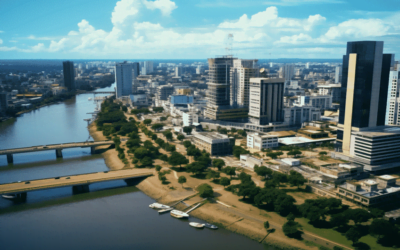Hey there, fellow drone enthusiasts and curious minds! Have you ever found yourself eager to explore the Swiss skies with your trusty drone, only to be held back by the mysterious labyrinth of drone regulations? I know the feeling; that’s why I’m here to share the knowledge and insights I’ve gathered on Switzerland Drone Laws.
So, if you’ve been wondering how to navigate the Swiss drone regulations, stick around because I’ve got the answers you’re searching for.
You see, I’ve embarked on a deep dive into the world of Switzerland’s drone laws, leaving no stone unturned. The quest to understand these regulations led me to explore the intricacies of flying drones within the picturesque Swiss landscapes.
From the high-altitude Alpine regions to the serene lakeshores, I’ve uncovered the rules and guidelines that ensure both safety and enjoyment.
I’ve sifted through the official resources, connected with experts, and gained first-hand knowledge to unravel the complexities of Switzerland’s drone laws.
Now, if you’re wondering how to fly your drone legally in Switzerland, you’re in the right place. In the upcoming sections of this article, I’ll take you through the key drone regulations specific to Switzerland.
You’ll discover the various categories of drone operators, flight restrictions, and essential guidelines to ensure a smooth and compliant drone experience. So, if you’re seeking a solution to your drone-related questions in Switzerland, keep reading, and I’ll provide you with the insights and advice you need to take to the skies with confidence.
- Categories of Drone Operators in Switzerland
- General Rules for Flying a Drone Within the European Union
- General Rules for Flying a Drone in Switzerland
- Categories of Allowed Drone Flights in Switzerland
- Conditions Required to Avoid Authorization
- Registration in Switzerland
- Notes for Recreational and Commercial Drone Pilots
- Switzerland No Fly Zones or No Drone Zones
- Bringing Your Drone On Airplanes Guide to Switzerland
- Final Thoughts on Switzerland Drone Laws
- Frequently Asked Questions About Switzerland Drone Laws
Categories of Drone Operators in Switzerland

When it comes to exploring the enchanting Swiss skies with your drone, it’s essential to understand where you fit into the grand scheme of drone operators.
Switzerland has neatly categorized drone enthusiasts like us, and believe me, it’s not as complex as it sounds. Let’s break it down.
Different Categories of Drone Operators
First things first, there’s a category for everyone. Whether you’re a hobbyist who flies drones for the pure thrill, a commercial operator aiming to capture stunning aerial footage, a visitor eager to document your Swiss adventures,, or even part of the government ensuring safety and security – there’s a place for you in the Swiss drone world.
Regulations and Requirements for Each Category
So, what’s the deal for each category? Well, if you’re a hobbyist, you’re in luck. You’re allowed to fly drones in Switzerland as long as you follow some simple rules. On the flip side, commercial operators have a bit more paperwork to deal with, but it’s nothing you can’t handle.
Visitors, don’t fret. You can also enjoy your drone flights, but there are some rules you need to follow. And for government drone operators, rest assured that you have your own set of regulations to maintain the skies’ safety.
In the following sections, we’ll dive into the specifics of each category and provide you with the details you need to navigate Switzerland’s drone regulations like a pro.
So, stick around, and I’ll guide you through the fascinating world of Swiss drone laws, one category at a time.
Also Read: Sweden Drone Regulation 2024
General Rules for Flying a Drone Within the European Union

Now, here’s where it gets really interesting. Switzerland might not be part of the European Union, but when it comes to drone laws, it’s taken a page out of the EU’s rulebook. Let’s take a closer look at how this dynamic plays out.
Switzerland’s Adoption of EU Drone Laws
So Switzerland has jumped on board with the European Union’s drone regulations. That means they follow the rules set by the European Union Aviation Safety Agency (EASA). But wait, there’s more.
Switzerland also has some unique regulations of its own, giving drone enthusiasts a blend of international and local guidelines to follow. It’s like having the best of both worlds!
The Open Category and Its Criteria
Now, let’s talk about the Open Category, the starting point for most drone operators. It’s designed for drones with a maximum take-off mass of less than 25 kg (that’s about 55 lbs). But here’s the catch – you’ve got to keep your drone a safe distance away from people.
It’s all about safety first. Oh, and unless your drone has a class identification label or weighs less than 250 g (that’s 0.55 lbs), you can’t fly directly over people.
The drone must also stay below 120m (roughly 400ft) and avoid carrying any dangerous goods or dropping stuff from the sky. So, while there’s a bit to remember, it’s all for a safe and enjoyable drone experience.
Also Read: Suriname Drone Regulation 2024
General Rules for Flying a Drone in Switzerland

Now, let’s get into the nitty-gritty of flying a drone in Switzerland. It’s not just about taking off and capturing breathtaking views; there are some important rules and regulations to keep in mind. So, let’s dive right in.
Detailed Regulations for Flying Drones in Switzerland
When it comes to flying your drone, Switzerland has some specific guidelines in place. If you’ve got direct eye contact with your drone, you’re good to go without a permit.
However, if you plan to use technical aids like binoculars or video glasses to enhance your view, you’ll need a license from the Federal Office of Civil Aviation (FOCA).
Now, within your line of sight, you can also use FPV goggles or similar tools, provided you have a second visual observer keeping an eye on the flight and ready to step in if necessary. It’s all about ensuring the safety and security of your drone flights.
Restrictions and Guidelines for Special Areas
Now, there are a few places where drone flights are strictly off-limits, like hunting or protected areas for water and migratory birds.
Privacy and the Data Protection Act also come into play when it comes to aerial photography. So, if you’re planning to capture those stunning shots, be mindful of the regulations to respect everyone’s rights.
Safety Measures and Crowd Control
Safety is paramount when it comes to drone operations in Switzerland. If your drone weighs more than 500 grams (about 1.1 pounds), you’re required to have at least 1 million francs of insurance coverage.
Plus, there’s a strict no-fly zone within 5 kilometers (3.1 miles) of an airport, and you should keep your drone below 120 meters (approximately 400 feet) above the ground. Operating over or near crowds is generally discouraged, with the principle being to maintain a safe distance of at least 100 meters (328 feet).
Also Read: South Sudan Drone Regulation 2024
Categories of Allowed Drone Flights in Switzerland

Now, it’s time to break down the different categories of drone flights in Switzerland. Think of it like choosing the right path for your drone adventure. So, let’s explore these categories together.
Understanding the Three Categories
In Switzerland, drone flights are neatly categorized into three main groups: Open, Specific, and certified. Each category corresponds to a certain level of risk involved in the drone operation.
The choice you make depends on factors like your drone’s weight, the areas you plan to fly in, and the safety measures you’re willing to put in place. It’s all about matching the right category to your drone adventure.
Criteria and Requirements for Each Category
Now, let’s delve into the nitty-gritty details of these categories. If you’re starting with the Open Category, your drone should have a maximum take-off mass of less than 25 kg (around 55 lbs), and you’ll need to keep it within a visual line of sight at a maximum altitude of 120 meters.
If you check all those boxes, you’re ready to fly without prior authorization. But if you’re venturing into the Specific or Certified Categories, there are more regulations to consider, including the need for authorization and risk assessment.
Also Read: Sudan Drone Regulation 2024
Conditions Required to Avoid Authorization

Let’s talk about the conditions you need to meet if you want to skip the hassle of obtaining operational authorization. It’s all about keeping things straightforward and legal.
The Key Conditions
To avoid the complexity of operational authorization, there are a few key conditions you must meet. First up, registration – you’ll need to ensure your drone is registered, whether you’re an EU resident or not.
This registration is essential to keeping tabs on drones and their operators. Insurance coverage is another must. In Switzerland, for drones weighing over 500 grams (about 1.1 pounds), you’ve got to guarantee at least 1 million francs for any potential damages.
You’ll also need to show proof of competency depending on the subcategory of your drone operation, which means getting certified for A1, A3, and additionally A2.
Finally, always keep your drone in your visual line of sight, fly below 120 meters, and never carry dangerous goods or drop materials.
Importance of Compliance
Now, you might wonder why it’s so important to follow these conditions. Well, it’s all about safety, accountability, and ensuring the smooth operation of drones in Swiss airspace.
Compliance not only keeps you on the right side of the law but also helps maintain the reputation of drone enthusiasts.
It’s a collective effort to ensure that drones can be enjoyed responsibly and without causing harm to people or property. So, always make sure you check these boxes to enjoy your drone flights with peace of mind.
Also Read: Sri Lanka Drone Regulation 2024
Registration in Switzerland

Now, let’s dive into the nitty-gritty of registration – a vital step for every drone operator in Switzerland.
Registration Requirements
The first thing you need to know is that registration requirements in Switzerland vary depending on the mass of your Unmanned Aircraft System (UAS). If your drone weighs 250 grams or more, you must register it.
And here’s a little extra detail – drones under 250 grams but equipped with a camera or microphone fall under this category too.
So, make sure to check your drone’s weight and features. Also, ensure your drone is insured. In Switzerland, drones over 500 grams, which is roughly 1.1 pounds, must have insurance coverage of at least 1 million francs. Safety and responsibility are the name of the game here.
Who Needs to Register and How?
So, who exactly needs to go through the registration process? Well, if you’re an operator of a UAS with a mass of 250 grams or more, or if your drone is under 250 grams but packs a camera or microphone, you’ll have to register. The process itself is pretty straightforward.
Natural persons, which means individuals, should register in the country where they reside. Legal entities, like companies or organizations, should register where their principal place of business is located. And remember, you can only register in one Member State at a time.
So, when you’ve got all the paperwork in order and your drone is set, it’s time to take to the Swiss skies—responsibly and legally.
Also Read: Spain Drone Regulation 2024
Notes for Recreational and Commercial Drone Pilots

Now, let’s talk about some valuable insights for both recreational and commercial drone pilots, especially if you’re operating within the Open Category.
Operating Within the Open Category
If you’re piloting a drone within the Open Category, you’re likely engaging in leisurely flights or low-risk commercial activities.
It’s a great place to start, but it comes with its own set of requirements. The Open Category is further divided into three sub-categories: A1, A2, and A3.
In the A1 sub-category, you can fly your drone over people, but not over large crowds. A2 allows you to fly your drone close to people, while A3 permits flights far from people.
It’s important to understand which subcategory your activity falls under, as the rules and training requirements vary.
One key thing to remember is that if you comply with the relevant requirements of subcategories A1, A2, and A3, you don’t need operational authorization before taking off. This flexibility can be a real advantage for drone enthusiasts and low-risk commercial operators.
So, if you’re planning to explore the Swiss skies for recreational fun or get your business off the ground with some awesome aerial shots, understanding the Open Category and its subcategories is a great place to begin. It keeps your flights safe, legal, and enjoyable.
Also Read: South Africa Drone Regulation 2024
Switzerland No Fly Zones or No Drone Zones

Navigating the Swiss skies with your drone is an incredible experience, but there are certain areas where drone flights are a no-go. It’s crucial to be aware of these no-fly zones, so let’s delve into what you need to know.
Know the No-Fly Zones
Switzerland designates specific areas where drone flights are restricted. These zones often include sensitive locations like government facilities, military areas, and more.
If you plan to capture some breathtaking aerial views, it’s essential to steer clear of these restricted zones to avoid any legal trouble.
In these no-fly zones, drone flights are prohibited, and rightfully so, considering the importance of these areas.
To fly within or near them, you’ll typically need proper authorization, which can be quite challenging to obtain.
So, when planning your drone adventure in Switzerland, always check for any nearby no-fly zones to ensure a smooth and lawful flight.
Authorizations for Restricted Areas
If you have a legitimate reason to fly your drone within these restricted areas, you’ll need authorization. The process can be complex, and it’s wise to plan well in advance if you require such permission.
For detailed information on Switzerland’s no-fly zones, specific authorizations, and how to obtain them, I recommend checking out the official resources provided by the Federal Office of Civil Aviation (FOCA).
They offer comprehensive guidance on this topic, ensuring you have all the necessary information to fly responsibly and in compliance with the law.
So, when you’re preparing for your drone adventure, always stay informed about no-fly zones and the authorization process.
It’s not just about following the rules; it’s about ensuring safety and respecting the security and privacy of sensitive areas.
Also Read: Somalia Drone Regulation 2024
Bringing Your Drone On Airplanes Guide to Switzerland

Air travel opens up exciting opportunities for capturing stunning aerial footage in new and distant locations.
If you’re thinking about taking your drone on your next adventure, there are a few essential things to keep in mind.
Traveling with Your Drone
First, consider how you’ll bring your drone along. I highly recommend using carry-on luggage whenever possible. Why? Well, according to the Montreal Convention, airlines are generally liable for losses up to around $1,000.
That’s not much when you think about the value of your drone. When you’re traveling internationally, especially with many connections, theft and lost luggage can be quite common. So, carrying your drone on board ensures it stays with you throughout your journey.
However, if your drone is worth more than USD 1,000 and carrying it onto the plane isn’t feasible, you might want to consider shipping it through services like DHL, FedEx, or UPS.
These options often allow you to fully insure your shipment, providing peace of mind when your drone is in transit.
Handling Drone Batteries
When it comes to drone batteries, there are some important safety considerations. It’s crucial to know that lithium-ion batteries, the kind typically used in drones, are classified as “dangerous goods” by airlines.
Due to a history of battery-related incidents, the rules for transporting them on planes are incredibly strict.
To ensure you comply with these regulations and avoid any hassle at the airport, it’s a good practice to place all your drone batteries in a medium-sized LiPo Battery Bag.
These bags are designed to contain any potential fire risks. Make sure to bring these bags in your carry-on luggage to keep them within your sight.
This approach not only helps you adhere to safety regulations but also ensures you won’t run into trouble with airline authorities.
It’s a small but significant step in making your drone travel experience as smooth as possible. So, keep your batteries safe and your adventures sky-high!
Also Read: Solomon Islands Drone Regulation 2024
Final Thoughts on Switzerland Drone Laws

As we wrap up this journey through the skies of Switzerland, it’s time for a quick recap of what we’ve learned about Switzerland’s drone laws.
We began by delving into the various categories of drone operators in Switzerland, each with its unique set of regulations. Whether you’re a hobbyist, a commercial operator, a visitor, or part of the government, understanding the specific rules that apply to your category is essential. This clarity ensures your drone adventures remain safe and within the bounds of the law.
Throughout our exploration, one thing remained constant – the emphasis on safety and compliance. Adhering to these rules isn’t just a legal obligation; it’s a commitment to ensuring that the skies above Switzerland remain a secure space for all. We’ve seen how these regulations can help drone enthusiasts capture breathtaking footage without infringing on anyone’s privacy or causing safety concerns.
It’s crucial to carry this knowledge with you on your drone adventures in Switzerland. These rules aren’t just a formality; they are the foundation of responsible and enjoyable drone flights. So, when you’re soaring over the Swiss landscapes, remember the guidelines and let your drone take you on incredible journeys safely and responsibly.
Frequently Asked Questions About Switzerland Drone Laws
1. Can I fly my drone in Switzerland without any restrictions?
Switzerland does allow drone flights, but they are subject to specific regulations. Depending on the category of drone operator you fall into, the rules may vary.
Hobbyists, commercial operators, visitors, and government drone operators each have their own set of requirements and limitations.
While hobbyists enjoy some freedoms, especially in the Open category, they must still adhere to rules such as flying within the visual line of sight and staying below 120 meters in altitude.
2. Do I need insurance to fly a drone in Switzerland as a hobbyist?
While drone insurance is not legally required for hobbyists in Switzerland, it’s highly recommended. Accidents can happen, and having insurance coverage can protect you financially in case your drone causes damage or injury.
For commercial operators, drone insurance is mandatory. It’s a critical aspect of responsible drone operation, ensuring you’re prepared for any unforeseen circumstances.
3. What are the restrictions for flying a drone near airports in Switzerland?
Flying your drone within 5 kilometers of airports or areas where aircraft are operating is strictly prohibited. This rule is in place to ensure the safety of manned aviation.
Violating this regulation can lead to severe consequences, including fines or legal actions, and it poses a significant safety risk.
4. Are there any no-fly zones in Switzerland?
Yes, Switzerland has designated no-fly zones, and it’s essential to be aware of these areas. They may include government or military facilities, protected wildlife areas, and other sensitive locations.
To operate your drone in these areas, you typically need specific authorization, and flying in these zones without permission is illegal.
5. How can I bring my drone on an airplane when traveling to Switzerland?
When traveling with your drone to Switzerland, it’s recommended to carry it in your carry-on luggage. Airlines are typically only liable for losses of up to a certain value, so stowing your drone in your carry-on helps minimize the risk of loss or theft.
Additionally, be sure to pack your drone batteries in a medium-sized Lipo Battery Bag and bring them in your carry-on bag, as airlines have strict rules regarding the transport of lithium-ion batteries. Failure to comply with these rules can result in the airline seizing the batteries or even fines.













